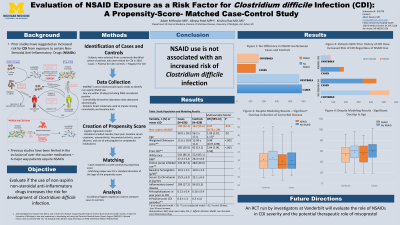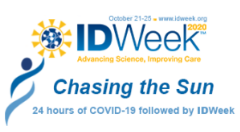Category: HAI: C. difficile
Poster Session: HAI: C. difficile
791 - Evaluation of NSAID Exposure as a Risk Factor for Clostridium difficile infection: A Propensity-Score-Matched Case-Control Study


Adam M. Ressler
Infectious Disease Fellow
University of Michigan
Ann Arbor, MichiganDisclosure: I do not have any relevant financial / non-financial relationships with any proprietary interests.
- AP
Alieysa Patel
Clinical Subjects Associate
University of Michigan
Ann Arbor, MichiganDisclosure: I do not have any relevant financial / non-financial relationships with any proprietary interests.
- KR
Krishna Rao
Assistant Professor
Department of Internal Medicine, Infectious Diseases Division University of Michigan, Ann Arbor, Michigan
Ann Arbor, MIDisclosure: Bio-K+ International, Inc. (Consultant)Merck and Co., Inc. (Research Grant or Support)Roche Molecular Systems, Inc. (Consultant)
Presenting Author(s)
Co-Author(s)
Background: Background. Exposure to certain medications, particularly antibiotics and proton pump inhibitors, has been associated with increased risk for Clostridium difficile infection (CDI). Studies have suggested an increased risk for CDI associated with exposure to certain non-steroidal anti-inflammatory drugs (NSAIDs). We conducted a retrospective case-control study to evaluate the risk for CDI associated with NSAID use.
Methods: Methods. The population included 1338 patients tested for CDI from February–December 2016 at the University of Michigan. NSAID use within 30 days of CDI testing was determined by chart review. Both scheduled and as-needed NSAID use met the definition for exposure, but aspirin use alone did not. Additional clinical data such as comorbid disease and baseline laboratory parameters were extracted through electronic query. A random forest model imputed missing data. A propensity score for NSAID use was developed via logistic regression and included gender, back pain, baseline serum creatinine, osteoarthritis, rheumatoid arthritis, serum albumin, and use of anticoagulant or antiplatelet medications. Cases were matched 1:1 with C. difficile negative controls by propensity score, with a matching caliper of 0.2 x standard deviation of the logit of the score. The final study population consisted of 1256 cases and their matched controls, however 6 cases could not be matched to controls as none had scores within the matching caliper. Conditional logistic regression was used to compare cases to controls.
Results:
Results. NSAID use was similar between the two groups on unadjusted analyses. The adjusted, multivariable model demonstrates that non-aspirin NSAID use is not a significant risk factor for CDI (P =.816), after adjustment for comorbid disease burden, age, and history of prior CDI (Table). Older age and prior CDI were independent risk factors for CDI (Table).Table: Study population and modeling results.jpg)
Conclusion: Conclusion. In this retrospective case-control study, non-aspirin NSAID use was not associated with an increased risk of CDI. To our knowledge, this is the first study of NSAID use as a risk factor for CDI that accounted for bias due to treatment assignment using a propensity score. Future studies should account for frequency or chronicity of NSAID use, which may affect the results.

